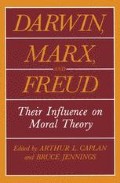Abstract
What bearing should Darwinism (that is, the theory of the origin of species, including the human species, by natural selection) have on ethics (that is, on our thoughts about how we as human beings should live our lives)? This question is but a recent and specific example of the age-old and general question about the relation between our knowledge of nature and our thoughts about ethics. This broader question, in turn, presupposes prior questions, both about the nature of nature and about the nature of ethics and the good for man. A full exploration of the former would carry us into questions about change, time, energy, cause, and, ultimately, about being itself. A full exploration of the latter would involve questions about justice, nobility, freedom, virtue, duty, happiness, pleasure, and, ultimately, about good itself. Both explorations would also necessarily consider the intelligibility of what is and what is good, as well as the powers and limits of the thinking mind to discover the intelligibly true and good.
Access this chapter
Tax calculation will be finalised at checkout
Purchases are for personal use only
Preview
Unable to display preview. Download preview PDF.
References
For example, in his opening paragraph, Professor Flew asserts that most of Plato’s Laws and much of the Republic “is not philosophy” except in the loose sense that opinions about general matters constitute, say, my “philosophy” of life. Would Plato, or any other genuine philosopher in the tradition, agree? Later, he makes the peculiar remark, “No philosopher has any business either to despise or not to share such longings,” that is, longings “to see things as a whole, to find some deep, comprehensive, world picture against which they may set their lives” (p. 33). One would have thought such desires were the heart of the philosophical activity itself. Does any other kind of activity deserve the name of philosophizing?
Professor Flew, against his own strictures, often appears to commit the equivalent of the naturalistic fallacy, drawing conclusions about what we should believe or hold from his descriptions of what some men do believe or hold: (1) “The two understandings of philosophy thus illustrated should both be acceptable” (p. 4; ironically, this remark is but one sentence removed from his insistence on the paramount importance of the uought-is” question); (2) “There is indeed ‘a grandeur in this view of life,’ and it is something that should be part of the world outlook of every modern person” (p. 17; Why should it? Because it is grand? Modern? True? Why, according to Professor Flew, ought we to believe what is?); (3) “He [i.e., man] no longer ought to feel separated from the rest of nature, for he is part of it” (p. 33; Professor Flew is approvingly quoting Julian Huxley). Apparently Professor Flew believes that certain kinds of sentiments or judgments are not just arbitrary projections but fitting responses called forth by the way things are.
Indeed, Aristotle explicitly denies that there are any universally valid rules of action, and says, quite enigmatically, that all of justice—including natural justice—is changeable. (Nicomachean Ethics 1104a4, 1134b30)
It is true that Lucretius gave politics and civil virtue much lower marks than did Aristotle.
For example, “the polis comes to be for the sake of life, but it exists for the sake of living well.” (Aristotle Politics 1152b29). Another example: “[S]uch ‘means’ of survival as perception and emotion are never to be judged as means merely, but also as qualities of the life to be preserved and therefore as aspects of the end. It is one of the paradoxes of life that it employs means which modify the end and themselves become part of it.” (Hans Jonas, The Phenomenon of Life [New York: Dell, 1966], p. 106.)
See, for example, his discussion of what he calls “the teaching of nature” in the “Sixth Meditation” (Meditations) and in The Passions of the Soul.
”Teleology and Darwin’s The Origin of Species: Beyond Chance and Necessity?” in Organism, Medicine and Metaphysics, ed. Stuart Spicker (Dordrecht: D. Reidel, 1978), pp. 97–120. This article also elaborates on the remarks of the rest of this paragraph.
Bearing on this subject of ascent, see the beautiful book Animal Forms and Patterns by the Swiss biologist, Adolf Portmann (New York: Schocken Books 1967). See also the very provocative writings of C. H. Waddington, especially The Ethical Animal (Chicago: University of Chicago Press, 1967).
See note 12.
For an excellent rebuttal to “evolutionary ethics,” see C. S. Lewis, The Abolition of Man (New York: Macmillan, 1947), especially chap. 2, “The Way.”
See, for example, Antonio Moreno, “Some Philosophical Considerations on Biological Evolution,” The Thomist, 37:417–54, 1973.
Editor information
Editors and Affiliations
Rights and permissions
Copyright information
© 1984 The Hastings Center
About this chapter
Cite this chapter
Kass, L.R. (1984). Darwinism and Ethics. In: Caplan, A.L., Jennings, B. (eds) Darwin, Marx and Freud. The Hastings Center Series in Ethics. Springer, Boston, MA. https://doi.org/10.1007/978-1-4684-7850-1_3
Download citation
DOI: https://doi.org/10.1007/978-1-4684-7850-1_3
Publisher Name: Springer, Boston, MA
Print ISBN: 978-1-4684-7852-5
Online ISBN: 978-1-4684-7850-1
eBook Packages: Springer Book Archive

